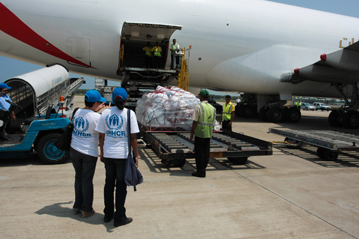NATO/UNHCR airlift from Turkey to Pakistan ends after 103 flights
NATO/UNHCR airlift from Turkey to Pakistan ends after 103 flights

GENEVA, November 18 (UNHCR) - The huge NATO-UNHCR airlift of aid from Turkey to the victims of the earthquake in Pakistan has come to an end after one month and 103 flights, the UN refugee agency announced on Friday. However, NATO flights will continue to fly in UNHCR supplies from other countries.
In all, between the first flight out of Incirlik airbase on 19 October and the 103rd flight from the same base on Thursday night, NATO planes carried 1,161 tonnes of UNHCR supplies from the agency's stockpiles in the southern Turkish port of Iskenderun to the Pakistani capital Islamabad.
"We again thank NATO, the Turkish government and all of those nations who contributed aircraft - Turkey, the United Kingdom, the United States, Italy, France, Greece and Denmark," UNHCR spokeswoman Jennifer Pagonis said after announcing the completion of the Turkish leg of the airlift at a press conference in Geneva.
However NATO's involvement with the UNHCR relief effort is not ending simply because the agency's stocks in Turkey have been exhausted. "NATO has agreed to continue flying our relief supplies from elsewhere, including at the beginning of next week more than 300,000 blankets from Amman, Jordan," Pagonis said, adding that the blankets would be transported on five NATO-chartered Boeing 747 flights.
Since the devastating earthquake struck on 8 October, the UN refugee agency has transported over 290,0000 blankets, 22,000 tents, 33,000 jerry cans, 100,0000 plastic sheets and many tens of thousands of other relief items to Pakistan with the help of NATO, as well as on UNHCR's own chartered commercial flights and road convoys. A trainload of 40,000 blankets supplied by UNHCR is also currently on its way from India to Pakistan.
Meanwhile, foreign aircraft were also plying the skies at the other end of the highly complex logistical operation set up to funnel aid from different parts of the world to the earthquake zone in the far north of Pakistan: UNHCR also announced that the airlift of its relief supplies by UK Royal Air Force Chinook helicopters to communities in the remote Leepa Valley was entering its third and final day on Friday. Meanwhile, dozens of other helicopters belonging to the Pakistan army, lent by foreign governments or chartered by aid agencies, continue the race against time to get enough aid - especially shelter materials - to the hundreds of isolated mountain communities before winter sets in.
In the first two days, the RAF Chinooks distributed a total of 934 tents, 19,230 blankets, 3,900 plastic sheets, 1,640 kitchen sets and 2,400 jerry cans to the earthquake survivors still living among the ruins in the Leepa Valley, Pagonis said. The supplies were handed over to more than 600 families in an area which had until very recently remained cut off by landslides. In all, UNHCR said, the UK helicopters would airlift a total of 240 tonnes of relief items to the Leepa Valley area, which will be distributed on the ground by agency's own staff alongside the Pakistani army.
The Pakistan army estimates that a total of 75,000 people have come down from the upper valleys since the earthquake hit. They include 55,000 from the Allai Valley and 20,000 from the Kaghan Valley. Of these, an estimated 19,000 have so far settled in organized camps. The rest have either moved in with relatives, rented houses in towns like Mansehra and Abbottabad, or moved into spontaneous camps.

People in the camps are being provided with additional relief items, including three blankets, two pieces of plastic sheeting to cover their tents, sleeping bags and mattresses for the most vulnerable, as well as stoves, kerosene, gas, coal, charcoal and wood.
"More arrivals can be expected, so we've got to get the camps in shape," Pagonis said. "With our NGO and Pakistani military partners, we are 'winterizing' the camps as quickly as possible." The government has asked UNHCR to help with the selection of new sites and the development of additional camps to accommodate additional new arrivals who may decide to leave the high valleys as winter sets in.
In all, UNHCR is aiming for a total of 30 properly planned and organized camps housing up to 150,000 people. Twenty of these have been established so far by the government with technical support from UNHCR and others. In all, the UN refugee agency plans to assist up to 500,000 beneficiaries over six months, including hundreds of thousands who will probably remain in their damaged villages or towns, or in some of the hundreds of spontaneous camps that have sprung up beside roads or next to water sources. It is hoped that by spring, many people will be able return to their places of origin.









